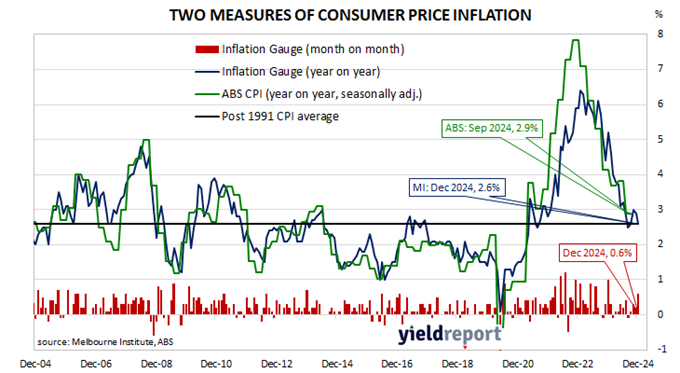Summary: Melbourne Institute Inflation Gauge index up 0.6% in December; up 2.6% on annual basis; ACGB yields rise; rate-cut expectations soften.
The Melbourne Institute’s Inflation Gauge is an attempt to replicate the ABS consumer price index (CPI) on a monthly basis. It has turned out to be a reliable leading indicator of the CPI, although there are periods in which the Inflation Gauge and the CPI have diverged for as long as twelve months. On average, the Inflation Gauge’s annual rate tends to overestimate the ABS rate by around 0.1%, or at least until recently.
The Melbourne Institute’s latest reading of its Inflation Gauge index indicates consumer prices increased by 0.6% in December, up from 0.2% in November and October’s 0.3%. However, inflation on an annual basis still slowed from 2.9% to 2.6%.
Short-term Australian Commonwealth Government bond yields jumped on the day while longer-term yields rose more moderately, somewhat in line with movements of US Treasury yields on Friday night. By the close of business, the 3-year ACGB yield had gained 13bps to 4.06%, the 10-year yield had added 9bps to 4.67% while the 20-year yield finished 4bps higher at 5.04%.
Expectations regarding rate cuts in the next twelve months softened, although a February cut is still currently viewed as a solid chance with at least one additional 25bp cut to follow. Cash futures contracts implied an average of 4.275% in February, 4.035% in May and 3.855% in August. December contracts implied 3.73%, 61bps less than the current cash rate.
Given the Inflation Gauge’s tendency to overestimate, the latest figures imply an official CPI reading of 0.4% (seasonally adjusted) for the December quarter or 2.5% in annual terms. However, it is worth noting the annual CPI rate to the end of March 2023 was 7.0% while the Inflation Gauge had implied a 5.7% annual rate at the time.


